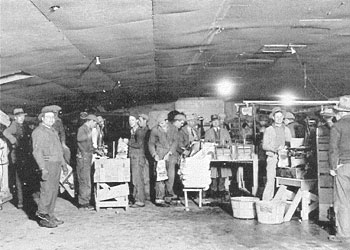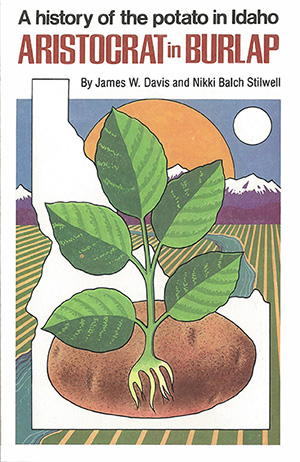 Terminal market repacker fills ten-pound bags with Idaho russets.
Terminal market repacker fills ten-pound bags with Idaho russets.
Establishing a reputation for quality was not an easy matter for a shipper. Potatoes were purchased from the grower on a "pack out" basis. This meant that potatoes were never weighed as they entered the dealer's packing shed, but were passed over the sorting table and separated into number ones and number twos. The culls were diverted for seed, starch, or livestock feed. The grower was then paid on the number of ones and twos that were packed out of his crop and loaded on the railroad car.
Growers were not eager to sell their crop to the shipper who was extremely fastidious about the quality that went into the bags since this usually meant a lower total dollar return to them. Growers frequently spent the entire time their lots were being sorted in the shipper's warehouse with "their heads in the cull chute," as the dealers described it. As a matter of fact, suspicion was wide spread among growers that dishonest shippers were somehow stealing a portion of each lot of potatoes that they bought from the growers. Not knowing the exact weight of the potatoes they brought to the warehouse, the number of bags loaded on railroad cars always seemed short of the growers' expectations from their crops. Although the farmer had no alternative market for his crop, relations were frequently less than cordial between the man who grew the crop and the dealer who sorted, packed, and shipped it.
The 1930s was a period in which the Idaho potato shipping industry established itself. Production had grown to 16,146,000 hundredweight by 1930, and Idaho® potatoes were gaining their national reputation for baking quality and the higher grading standards of Idaho shippers. With the expansion of potato acreage in Idaho and the increased importance of the Idaho® potato in national markets, sales problems began to develop. Chicago became the potato sales center for the nation and most of the cars of Idaho® potatoes that left the state were handled or influenced by Chicago potato interests. Idaho growers and shippers found it increasingly difficult to operate at the prices they received as a result of the virtual marketing monopoly of the Chicago group.
Potato growers and shippers in Idaho found a unique solution to their problem. Believing that a demand could be developed for Idaho® potatoes in major cities all over the United States, Idaho industry people caused the Idaho Fruit and Vegetable Advertising Commission to be created by a legislative act. After a "day in court" on which the constitutionality of the advertising concept was challenged, the promotional body set out to make the nation aware of Idaho's uniquely superior product.


 Terminal market repacker fills ten-pound bags with Idaho russets.
Terminal market repacker fills ten-pound bags with Idaho russets.